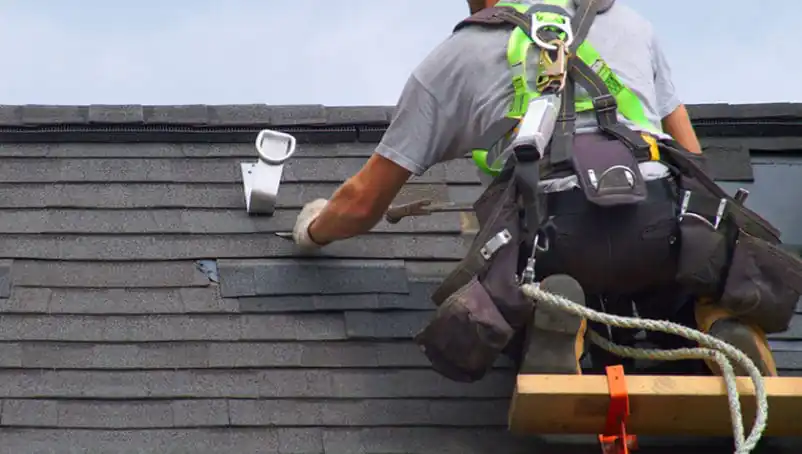Texas roofing license requirements
To qualify for a Texas roofing license, roofers must meet the following general requirements as set by the Roofing Contractors Association of Texas (RCAT):
- Be a principal in a Texas residential or commercial roofing company for a minimum of three years
- Submit satisfactory credit and business references upon request
- Provide proof of financial responsibility, including certificates of insurance for designated insurance coverage (details below)
- Be in good standing with the Better Business Bureau
- Pass a licensing exam consisting of a basic business and safety knowledge portion and either the residential or commercial roofing portion
- Complete and sign an application form and have it notarized
- Pay the appropriate licensing and exam fees (ranging from $450 to $950)
The specifics for required insurance, licensing exams and fees will vary based on the type of license you need, either residential or commercial. You can apply for both, but you must meet the higher commercial requirements and pay an additional fee.
Residential roofing contractor license requirements
Residential license holders must meet all of the general RCAT requirements to obtain a license. As part of this process, residential roofers must hold $300,000 in combined single limit general liability insurance for roofers. Alternatively, you can provide a $100,000 contractor’s surety bond.
As part of the testing process, residential roofers must pass the exam on basic business and safety knowledge and a residential roofing exam with 70% or higher on each portion. The fees for a residential roofing license in Texas are $450 for RCAT members or $750 for non-members. These fees include application processing, testing and the initial issue of your license.
Each year, you must renew your residential license by completing eight hours of continuing education credits and paying a $150 renewal fee.
Commercial roofing contractor license requirements
Commercial license holders must also meet the general RCAT requirements to obtain a license, but the insurance and testing requirements for this license are more stringent. Commercial roofers must hold $500,000 in combined single limit general liability insurance or provide a $100,000 contractor’s surety bond.
If you plan to obtain a commercial roofing license in Texas, you must also pass the basic business and safety knowledge exam and a commercial roofing exam with 70% or higher on each portion. The fees for a commercial roofing license are $450 for RCAT members or $750 for non-members.
Additionally, if you meet these requirements and pass both the commercial and residential roofing exams, you can pay a slightly higher fee ($650 for RCAT members or $950 for non-members) and earn your roofing license as both a residential and commercial roofer in Texas.
Taking the roofing license exam in Texas
To satisfy the roofing license exams, you will be given access to RCAT’s licensing portal that includes online study materials and preparation guides for the roofing exam. Once you have access to the portal, you will have 90 days to review the study material and pass the required exams. If you do not pass the exam within this time frame, you can pay a $50 fee for an additional 90 days of access to the exam portal. A maximum of three 90-day extensions per year are allowed to attempt the licensing exams.
Each exam consists of 50 multiple choice or true/false questions, and you will have 90 minutes to complete the exam. All exams are open book, but you will need to be very familiar with the test material and industry knowledge to complete the exam within the given time frame. You must also successfully pass the business and safety portion first before you can gain access to the commercial or residential roofing tests.
If you do not pass any portion of the test, you must wait a minimum of 14 days before attempting that portion of the test again. Within your 90-day access period to the testing portal, you may reattempt each portion of the exam up to three times.







